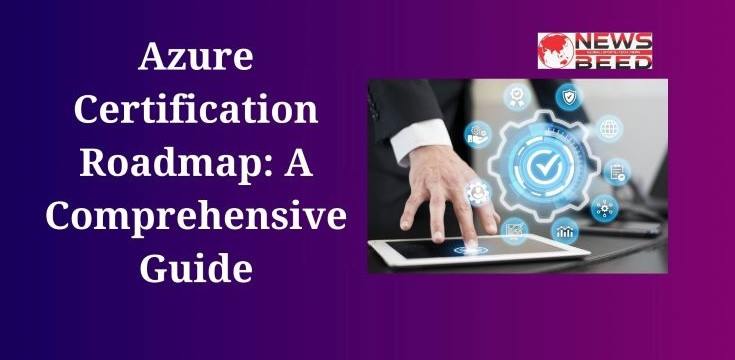The Microsoft Azure certification roadmap is a comprehensive guide designed to help IT professionals and developers validate their skills and expertise in various Azure technologies. Azure certifications are categorized into different role-based tracks, each focusing on specific job roles and responsibilities within the Azure ecosystem. In this detailed explanation, we’ll explore the Azure certification roadmap, covering key certifications and their associated paths.
Table of Contents
ToggleIntroduction to Azure Certifications
Microsoft Azure certifications are divided into three main categories based on job roles: Fundamentals, Associate, and Expert. Each category offers certifications tailored to specific roles and levels of expertise. These certifications are globally recognized and provide a standardized way for professionals to showcase their proficiency in Azure services.
Azure Fundamentals Certifications
1. Microsoft Certified: Azure Fundamentals (AZ-900)
The AZ-900 certification is designed for individuals who are new to Azure and want to establish a foundational understanding of cloud services. It covers basic concepts such as Azure architecture, core services, solutions, and pricing.
Also, Read This: What is Digital Marketing in Hindi
This certification is ideal for those in non-technical roles, such as sales, marketing, or management, who need a fundamental understanding of Azure.
Azure Associate Certifications
2. Microsoft Certified: Azure Administrator Associate (AZ-104)
The AZ-104 certification is suitable for administrators who manage Azure subscriptions, resources, and identities. It covers topics such as implementing and managing storage, deploying and managing virtual machines, configuring and managing virtual networks, and monitoring and backing up Azure resources.
3. Microsoft Certified: Azure Developer Associate (AZ-204)
The AZ-204 certification is tailored for developers who design and build solutions on Azure. It includes topics such as Azure SDKs, data storage solutions, security, and troubleshooting.
4. Microsoft Certified: Azure Security Engineer Associate (AZ-500)
The AZ-500 certification is aimed at security professionals responsible for implementing and managing security controls, identities, access, and protecting data, applications, and networks in cloud and hybrid environments.
5. Microsoft Certified: Azure AI Engineer Associate (AI-102)
The AI-102 certification is designed for AI engineers who implement natural language processing, speech, and computer vision capabilities in Azure. It covers designing and implementing AI solutions, monitoring and optimizing them, and connecting to data sources.
6. Microsoft Certified: Azure Data Engineer Associate (DP-203)
The DP-203 certification targets data engineers who design and implement the management, monitoring, security, and privacy of data using Azure data services.
7. Microsoft Certified: Azure IoT Developer Specialty (AZ-220)
The AZ-220 certification is for IoT developers who design and implement solutions that monitor and manage the IoT infrastructure, leverage Azure services for IoT, and implement security.
8. Microsoft Certified: Azure DevOps Engineer Expert (AZ-400)
The AZ-400 certification is designed for DevOps professionals who combine people, process, and technologies to continuously deliver valuable products and services. It covers planning, developing, delivering, and monitoring strategies.
Azure Expert Certifications
9. Microsoft Certified: Azure Solutions Architect Expert (AZ-303, AZ-304)
The AZ-303 and AZ-304 certifications are for solutions architects who advise stakeholders and translate business requirements into secure, scalable, and reliable solutions. These certifications cover topics such as networking, storage, security, and identity.
10. Microsoft Certified: Azure DevOps Engineer Expert (AZ-400)
The AZ-400 certification, also mentioned in the Associate category, is part of the Expert category. It focuses on DevOps practices, including continuous integration, continuous delivery, and continuous monitoring.
11. Microsoft Certified: Azure Security Engineer Expert (AZ-500)
The AZ-500 certification, mentioned in the Associate category, is also part of the Expert category, emphasizing advanced security management skills and practices.
Advanced Specializations
Beyond the core certifications, Microsoft offers advanced specializations for professionals looking to deepen their expertise in specific areas:
12. Microsoft Certified: Azure AI Engineer Associate (AI-102)
The AI-102 certification, mentioned in the Associate category, is also part of the Advanced Specializations category, focusing on advanced AI skills.
13. Microsoft Certified: Azure IoT Developer Specialty (AZ-220)
The AZ-220 certification, mentioned in the Associate category, is also part of the Advanced Specializations category, emphasizing advanced IoT development skills.
Also, Read This: Top 10 Most Popular Sports in India
Conclusion
The Azure certification roadmap offers a structured path for IT professionals and developers to validate their skills and expertise in Microsoft Azure. Whether you’re new to Azure or seeking advanced specializations, the certifications cover a broad range of roles and responsibilities within the cloud computing domain. Earning Azure certifications not only enhances your individual capabilities but also demonstrates your commitment to staying current in a rapidly evolving technology landscape. Keep in mind that the roadmap is subject to updates, so it’s essential to check the official Microsoft certification website for the latest information and exam details.




